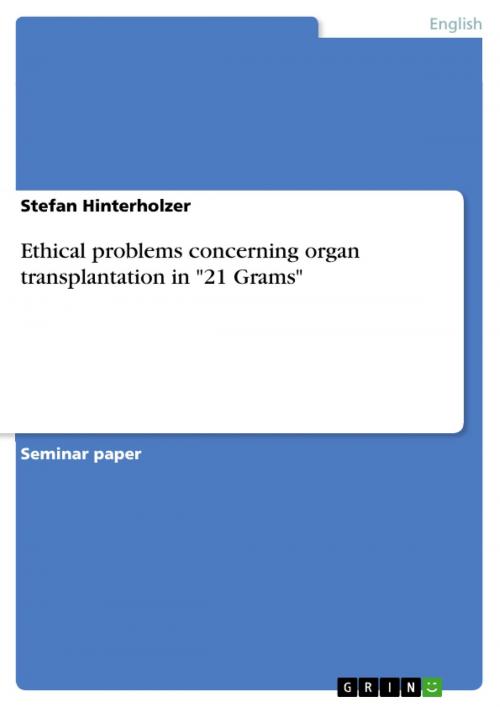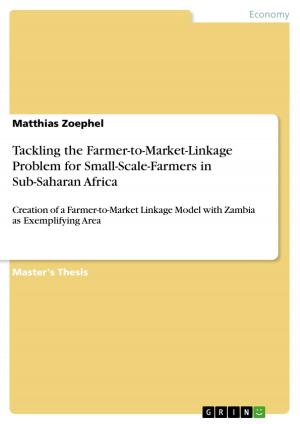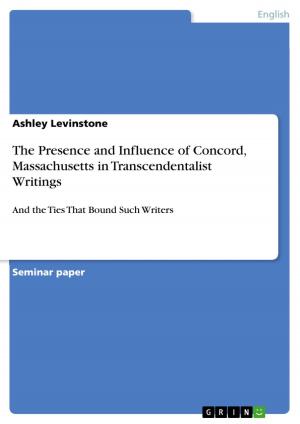Ethical problems concerning organ transplantation in '21 Grams'
Nonfiction, Entertainment, Drama, Anthologies| Author: | Stefan Hinterholzer | ISBN: | 9783640151950 |
| Publisher: | GRIN Publishing | Publication: | September 3, 2008 |
| Imprint: | GRIN Publishing | Language: | English |
| Author: | Stefan Hinterholzer |
| ISBN: | 9783640151950 |
| Publisher: | GRIN Publishing |
| Publication: | September 3, 2008 |
| Imprint: | GRIN Publishing |
| Language: | English |
Seminar paper from the year 2008 in the subject American Studies - Miscellaneous, grade: 2, University of Innsbruck (Department of American Studies), course: Ethical Issues in American Medical and Legal Narratives, 15 entries in the bibliography, language: English, abstract: 'How many lives do we live? How many times do we die? They say we all lose 21 grams... at the exact moment of our death. Everyone. And how much fits into 21 grams? How much is lost? When do we lose 21 grams? How much goes with them? How much is gained? How much is gained? Twenty-one grams. The weight of a stack of five nickels. The weight of a hummingbird. A chocolate bar. How much did 21 grams?' Paul Rivers leaves us with all these questions before he dies, and in fact, we need all these questions in order to reach a deeper understanding and to make sense of the movie. So, how much do 21 grams weigh? And what are these 21 grams. It is tempting to give a relatively simple answer from a medical or religious perspective. We may say that gases exhaust from our body or even that the soul escapes from the body when we die. But this movie goes a step further. These 21 grams apparently weigh so little but in the end weigh a lot. These 21 grams are the happiness of a family, the target of revenge, the reason for struggle, they are life itself. So our lives are dependent on these 21 grams, which shows that life is really fragile. And this leads us to the topic of this paper: organ transplantation. Organ transplantation gives us the possibility to save another person's life when our life is already over. For many people it is self-evident to donate an organ when someone else's life can be saved through that, and it may seem that there are no real problems or questions concerning organ transplantation, but there are. Organ transplantation is a much more controversial issue as most people might believe and there are definitely a number of ethical problems concerning organ transplantation. The aim of this paper is to analyze Alejandro González Iñárritu's movie 21 Grams and to describe the problems and questions connected with organ transplantation that come up. In order to provide a solid basis for the analysis, necessary background information will be presented and connected with the movie. First of all, the director will be presented briefly. Then, general questions and problems concerning organ transplantation in 21 Grams will be discussed and finally more complex issues (decision making, psychological problems and interest groups) will be dealt with.
Seminar paper from the year 2008 in the subject American Studies - Miscellaneous, grade: 2, University of Innsbruck (Department of American Studies), course: Ethical Issues in American Medical and Legal Narratives, 15 entries in the bibliography, language: English, abstract: 'How many lives do we live? How many times do we die? They say we all lose 21 grams... at the exact moment of our death. Everyone. And how much fits into 21 grams? How much is lost? When do we lose 21 grams? How much goes with them? How much is gained? How much is gained? Twenty-one grams. The weight of a stack of five nickels. The weight of a hummingbird. A chocolate bar. How much did 21 grams?' Paul Rivers leaves us with all these questions before he dies, and in fact, we need all these questions in order to reach a deeper understanding and to make sense of the movie. So, how much do 21 grams weigh? And what are these 21 grams. It is tempting to give a relatively simple answer from a medical or religious perspective. We may say that gases exhaust from our body or even that the soul escapes from the body when we die. But this movie goes a step further. These 21 grams apparently weigh so little but in the end weigh a lot. These 21 grams are the happiness of a family, the target of revenge, the reason for struggle, they are life itself. So our lives are dependent on these 21 grams, which shows that life is really fragile. And this leads us to the topic of this paper: organ transplantation. Organ transplantation gives us the possibility to save another person's life when our life is already over. For many people it is self-evident to donate an organ when someone else's life can be saved through that, and it may seem that there are no real problems or questions concerning organ transplantation, but there are. Organ transplantation is a much more controversial issue as most people might believe and there are definitely a number of ethical problems concerning organ transplantation. The aim of this paper is to analyze Alejandro González Iñárritu's movie 21 Grams and to describe the problems and questions connected with organ transplantation that come up. In order to provide a solid basis for the analysis, necessary background information will be presented and connected with the movie. First of all, the director will be presented briefly. Then, general questions and problems concerning organ transplantation in 21 Grams will be discussed and finally more complex issues (decision making, psychological problems and interest groups) will be dealt with.















